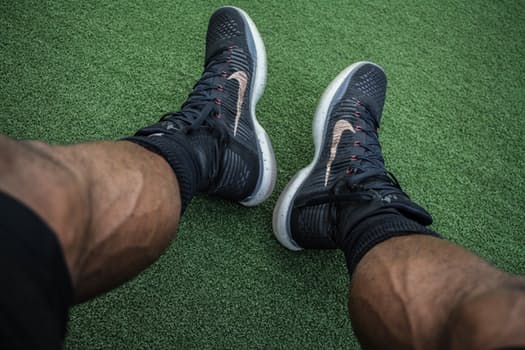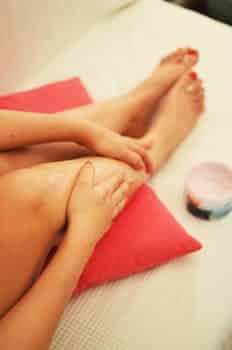Could Low Testosterone Increase the Risk of Varicose Veins in Men?

It’s a common misconception only women suffer from varicose veins, however, it is estimated that somewhere between 15% and 45% of men will develop varicose veins or venous insufficiency at some point in their lives. The exact number is unknown, primarily because a significant number of men do not seek treatment for vein disorders.
There are several factors that contribute to varicose vein formation; genetics, age, diet, exercise, stress, and weight are all important to vein health. But gender is also considered a risk factor and there are some indications that our “sex hormones” may be the culprit - particularly estrogen.
Estrogen in Men? Definitely!
While women synthesize most of their estrogen in their ovaries and other reproductive tissues, men produce estrogen through a process involving an enzyme called aromatase. Aromatase is found in many tissues including gonads, brain, adipose tissue, blood vessels, skin, and bone. Aging men sometimes have too much aromatase activity, which causes their testosterone to convert to excess estradiol, the predominant form of estrogen.
Estradiol is a known contributor to varicose vein development in pregnant women; it shrinks and impairs the function of venous valve flaps, breaks down the integrity of venous walls, and causes blood vessels to dilate, or get wider. So what does estrogen have to do with varicose veins in men? It could be a lot!
While it is too small to be clinically significant, a study published by researchers at the Universitat Leipzig in Germany noted that all of the men in their study with varicose veins had higher levels of estradiol and lower levels of testosterone (low T) compared to the men with healthy veins. What this shows is that estradiol alone is not the culprit, rather the ratio of estradiol to testosterone appears to be the determining factor.
As men age, testosterone levels naturally decline. Where a younger man’s testosterone to estrogen levels might naturally be 50:1, an older man might experience a ratio of 8:1. What the science seems to suggest is that when the ratio of estrogen to testosterone is out of whack, men are at higher risk for developing vein disorders.
Concerned About Your Vein Health?Click Here to Download a Self Assessment |
Restoring Hormone Balance is Good for Vein Health
The hormonal system helps to govern all aspects of the bodies’ functions. Its interconnectedness is complex; its balance is somewhat delicate and can be easily thrown off track. We are bombarded by stories about potential hormone disrupters and estrogen mimickers that some fear, are messing up these complex systems. Regardless of whether this is true, there are many lifestyle choices that men can make to help maintain—or restore—hormonal balance and improve their vein health.
- Maintain a healthy weight. Obesity is a significant risk factor, both for overproduction of estrogens and for varicose vein formation. Not only do the extra pounds increase strain on the vascular system, but also fat cells are particularly rich in the enzyme aromatase. The more aromatase in the system, the more testosterone will be converted to estradiol.
- Manage your stress levels. Cortisol, the hormone associated with the “fight or flight” response, increases when stress levels are high. High cortisol levels inhibit testosterone production.
- Get good quality sleep. Most testosterone is produced when we sleep. Actually, a lot of important things happen only when we are sleeping. Plus, sleep is just awesome.
- Nourish your body. It is important to eat a wide variety of whole foods in order to get the building blocks required for good hormone production and balance.
- Exercise the right amount. Moderation in all things. Studies have found that men who exercise a LOT have lower testosterone levels than their counterparts who exercise a moderate amount.
Men who develop varicose veins should consult with a qualified vein specialist to determine whether their vascular system is compromised, and what can be done to improve venous blood flow back to the heart.
Tempe-based vein specialist, Jilanne Rose of Advanced Vein Institute of Arizona, has noticed that men tend to wait until their veins get painful—or worse—before seeking treatment. Because of this tendency, she encourages everyone to look out for the vascular health of the men—and the women—in their lives.
And these days, Jilanne adds, it is easier than ever to improve vascular health. Vein treatments are less invasive, less painful, less expensive and more successful than they have ever been. Simply make an appointment with a qualified vein specialist who can precisely determine the health of your lower extremity veins, and help you make informed decisions about what treatment (if any) is right for you.
Q & A Pregunta: ¿Qué es el tiempo de induración? Respuesta: el downtime se basa en gran medida en el tipo de intervención y la severidad de la enfermedad venosa. Independientemente del tipo de intervención, nuestros pacientes reanudan todas las actividades el mismo día que el tratamiento. Algunos tratamientos requieren medias de compresión post-procedimiento, pero…
Read MoreQ & A Question: What is the down time? Answer: Downtime is largely based on the type of intervention and severity of the vein disease. Regardless of the type of intervention, our patients resume all activities the same day as treatment. Some treatments require compression stockings post-procedure, but most times these are worn for comfort and…
Read MoreVenas dolorosas y antiestéticas de las piernas Con el calor de Arizona, un día de verano, día de invierno, o cualquier día es ideal para usar shorts. Pero para aquellos con varices o venas de araña, la idea de usar pantalones cortos es preocupante y lleva a la ansiedad severa. Según el Departamento de salud…
Read MorePainful and unsightly leg veins With the Arizona heat, a summer day, winter day, or any day is ideal for wearing shorts. But for those with varicose veins or spider veins, the thought of wearing shorts is troubling and leads to severe anxiety. According to the U.S. Department of Health and Human Services, 55% of…
Read MorePregunta: ¿dos ultrasonidos Doppler encuentran cualquier coágulo de pierna? (Muslo o pantorrilla). ¿Es el síndrome de mayo-Thurner (MTS) posible y un venography necesario en mi caso?
Read MoreQuestion: Would two Doppler ultrasounds find any leg clots? (Thigh or calf). Is May-Thurner syndrome (MTS) possible and a venography necessary in my case?
Read MoreSi quisiera deshacerse de las venas antiestéticas, las venas de araña, o las varices dolorosas; a continuación, la búsqueda de resultados de escleroterapia, a través de un especialista en la vena, puede ser la elección correcta para ayudar a mejorar su dolor, la felicidad y su apariencia. En este procedimiento rutinario, el médico de la…
Read MoreIf would like to get rid of unsightly veins, spider veins, or painful varicose veins; then pursuing sclerotherapy results, through a vein specialist, may be the right choice to help improve your pain, happiness, and your look. In this routine procedure, your vein doctor injects a chemical into the veins which will cause the veins…
Read MoreParece concebible que cuando los expertos en Salud estiman que el 10 por ciento de las mujeres embarazadas experimentan várices vulvares, es decir, varices vaginales, podrían subestimar groseramente la incidencia de esta afección. Hay mujeres — que saben cuántas — que no reportarán este dolor, picazón, pesadez e incomodidad general en la vulva, ya sea…
Read MoreIt seems conceivable that when health experts estimate that 10 percent of pregnant women experience vulvar varicosities, that is to say vaginal varicose veins, they could be grossly underestimating the incidence of this condition. There are women—who knows how many—who will not report this pain, itch, heaviness and general discomfort in the vulva, either because…
Read More


